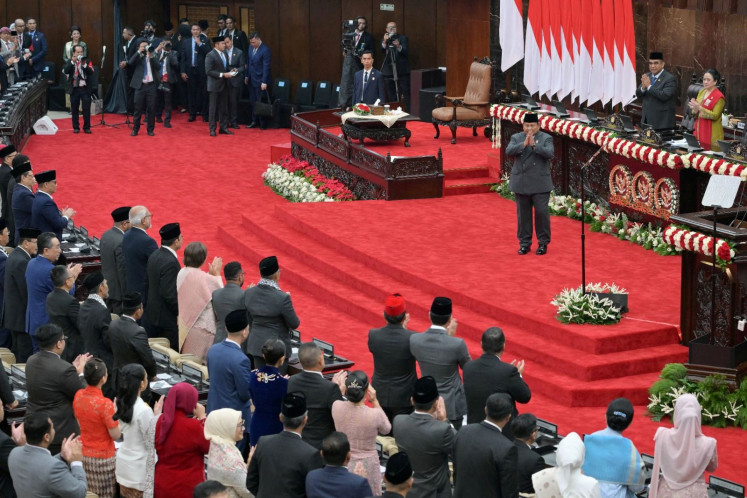Popular Reads
Top Results
Can't find what you're looking for?
View all search resultsPopular Reads
Top Results
Can't find what you're looking for?
View all search resultsEDITORIAL: The state's Perppu blank check
We share the concerns of most rights groups that have condemned the Perppu that the new law could lead the country back to a previous time, when the state monopolized right and wrong and stifled freedom of speech and to organize.
Change text size
Gift Premium Articles
to Anyone
 Public demonstration: Protesters stage a rally outside the House of Representatives building in Jakarta on Friday. They rejected the presidential regulation in-lieu of the law (Perppu) on mass organizations, which they claimed would pave the way for authoritarian rule. The protesters also rejected the revival of communism in the country. (JP/Ibrahim Irsyad)
Public demonstration: Protesters stage a rally outside the House of Representatives building in Jakarta on Friday. They rejected the presidential regulation in-lieu of the law (Perppu) on mass organizations, which they claimed would pave the way for authoritarian rule. The protesters also rejected the revival of communism in the country. (JP/Ibrahim Irsyad)
F
or the umpteenth time democracy has been reduced to a majority decision to back government policy, no matter whether it contravenes or endangers democracy itself. The House of Representatives, vote to endorse the government regulation in lieu of law (Perppu) on mass organizations on Tuesday is the latest example of this practice, which is no more than the tyranny of the majority.
The ruling coalition, minus the defiant National Mandate Party (PAN), outnumbered the opposition in passing into law the Perppu, which authorizes the government, specifically the Law and Human Rights Ministry, to disband mass organizations that it deems to be threats to Pancasila or the Constitution without having to wait for a court ruling as required under the old legislation enacted in 2013.
Clearly the new law gives the government a blank check to outlaw any organization or group it pleases on the grounds that their platforms or activities run counter to the state ideology or the Constitution, including Hizbut Tahrir Indonesia (HTI), which was dissolved in July based on the controversial Perppu.
Not only does the new law hand the government the power to disband any organization, it gives it the authority to judge whether a group is a menace, something that formerly lay in the hands of the judiciary as part of the checks and balances mechanism. With such privileges there is no guarantee the current or future governments will not be tempted to exercise the new power to quell critics or opposition using the pretext of national security.
For whatever reason, the new law marks a setback for democratization in Indonesia. We share the concerns of most rights groups that have condemned the Perppu that the new law could lead the country back to a previous time, when the state monopolized right and wrong and stifled freedom of speech and to organize.
Home Minister Tjahjo Kumolo said in his acceptance speech on the government’s behalf that the new law would enable the government to prevent the spread not only of radicalism, but also communism, Marxism and Leninism, reminiscent of the New Order’s popular lingo of ekstrim kiri and ekstrim kanan, or extreme leftist and rightist ideologies, respectively.
Indeed the government, through the new law, has shown its penchant for a revival of the bad old days, when political stability was the mantra for achieving economic well-being. Economic growth was pursued at the expense of democracy back then, but as we later witnessed such an approach was a total failure.
Of course the current government has a duty to ensure political stability to safeguard development programs and, hence, its 2019 agenda, but the choice of emulating the New Order’s authoritarian methods as a short-cut is a gamble that may not pay dividends.
It is an irony that a nation that embarked on democratization almost 20 years ago is now resurrecting the ghost of authoritarianism. The government simply lacks patience when dealing with outspoken opponents, which can now accuse the government of breaching the reform spirit and paint themselves as martyrs of democracy.









